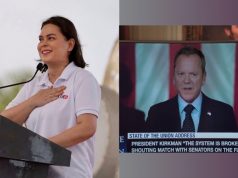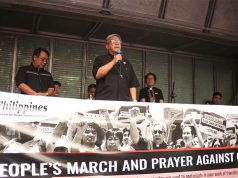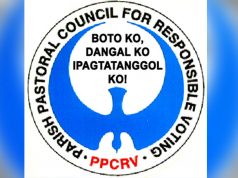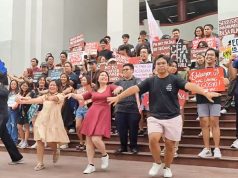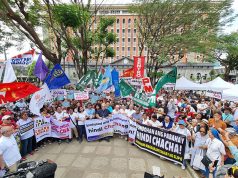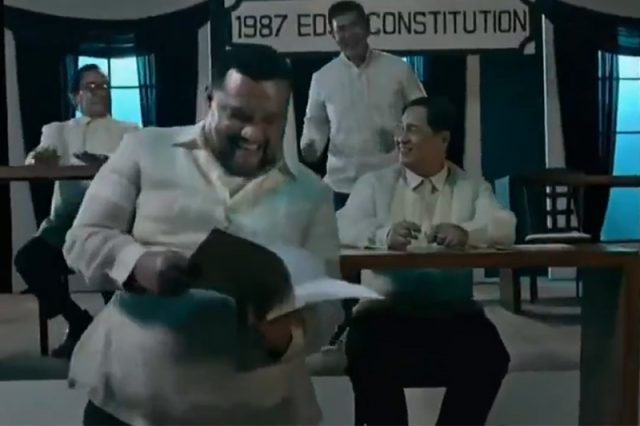
Some Filipino viewers raised eyebrows over a political television advertisement that promotes change of the current 1987 Constitution.
In social media posts, online users said that the ad blamed the people and the events behind the 1987 Constitution for education, agriculture and the economic woes of the country.
The ad in question was broadcast on major networks like GMA, TV5 and ABS-CBN on Tuesday evening. The airing of the ads coincided with the nationwide coverage of the annual Traslacion, a highly-anticipated major religious event of the Black Nazarene.
“Pangako nila… Pagsulong. Pero sa pagbuo ng 1987 Constitution, na Edsa-pwera tayo,” the ad said.
“Edsa-pwera” is a play on “echapwera” or “echapuwera,” a slang which means “ostracized” or to be “left out.” The term was repeatedly used in the ad.
The ad also claimed that the 1987 Constitution impeded the country’s development in terms of investment, education, agriculture and the economy, specifically claiming the rise of monopoly and the lack of land ownership of foreign investors.
It then urged the public to change the current constitution, claiming that it is not fair to Filipinos.
A screengrab showed that the ad was allegedly paid for by the Gana Atienza Avisado Law Offices, a Makati-based law firm.
A copy of the video can be viewed on the X platform. It was uploaded by journalist and esports host Paolo Barcelon. He said fellow media enthusiast Edjean Apilada grabbed the clip.
Screengrab of a TV ad that aired on GMA, TV5 and other networks during the Traslacion 2024 newscasts, saying that the 1987 Constitution should be replaced. Video grabbed by fellow media enthusiast, Edjean Apilada. pic.twitter.com/G6ionC8YQa
— Paolo “BravoSix” Barcelon (@bravo6livePH) January 9, 2024
Some Filipinos were disappointed over how the ad “blamed” the 1987 Constitution and the key events in its creation, including the historic People Power Revolution, in the country’s current state of affairs.
“EDSA IS NOT EDSA-PWERA. Let us be very clear about that. We will call out what needs calling out but eliminating A DICTATORSHIP and placing a more democratic constitution are not two of them. Call out that PAID commercial. ASK WHO PAID,” an online user said.
“Phasing out the 1987 Constitution for this? The only thing worse than a corporate takeover of public transport is a FOREIGN CORPORATE TAKEOVER of our natural resources,” another user wrote, referencing the government’s Public Utility Modernization Program.
“Napaka-vague ng commmercial, parang puro claims lang, wala naman facts or numbers. Sobrang umasenso na ang Pilipinas after 1987 in the greater scheme of things, nearing middle income country with lots of new infrastructure and stable electricity, though siyempre, dami pa ding mahirap,” wrote another Pinoy on Reddit.
“EDSA-pwera, obvious historical revision nanaman, parang sinasabi na dahil sa Edsa Revolution at dilawan eh naghirap ang ating bansa, baligtad na sa Martial Law ang nagpahirap,” the Redditor added.
An X user called the ad “ridiculously false” and shared infographics to counter claims that the country’s progress stopped upon the creation of the 1987 Constitution.
“We experienced the exact opposite of progress/asenso under Marcos’ watch,” the user wrote, citing the administration before the creation of the 1987 Constitution — that of late dictator Ferdinand Marcos Sr.
Not only coward, but also wrapped in disinformation. That bit where it said "Sa 1987 Constitution, natigil ang asenso natin" is so ridiculously false as we experienced the exact opposite of progress/asenso under Marcos' watch. (facts and figures c/o @IBONFoundation) https://t.co/pRYLx8V3DT pic.twitter.com/Bs4eeZUyYz
— Rupert Francis not of Assisi 🍉 (@rupertnotholmes) January 9, 2024
Former finance undersecretary Cielo Magno also commented on the ad’s claims about foreign investment, saying that land ownership “is not a factor.”
“Sa Vietnam, lease lang. Similar sa atin. Ang mga nakaka-discourage, corruption, bureaucratic inefficiency, political instability, poor quality of [infrastructure], high cost of doing business, etc,” she wrote.
Others thought the ad wanted to “push charter change” or constitutional reform. It is also colloquially known as “Cha-cha.”
“Some people really want to push charter change — by hook or by crook. This ad was shown at every commercial break of ‘TV Patrol,'” an online user said.
The Constitution
According to the Official Gazette, the 1987 Constitution was created as “a fresh start from the vestiges of a disgraced dictatorship, as suggested by Fr. Joaquin Bernas, S.J. and others.”
Its creation followed after the EDSA Revolution, a four-day occasion involving a series of public protests and demonstrations against the Marcos regime that culminated in a historic march along the main artery of Metro Manila.
During the Marcos regime, the country was placed under a nine-year Martial Law to supposedly quell communist insurgency, but critics said it was used by the dictator to extend his term.
The period saw the curtailment of civil rights and liberties, prevalence of extrajudicial killings and unsolved disappearances, media suppression and economic recession, among others.
London-based human rights organization Amnesty Organization said that “some 70,000 people were imprisoned and 34,000 were tortured; over 3,200 people were killed” in its imposition.
Meanwhile, lawyer Christian Monsod, a former Commission on Elections chair and one of the framers of the 1987 Constitution, said that they consulted with people prior to creating what would become the supreme law of the land.
“They preferred the stability of familiar structures — a democratic representative, presidential system, with checks and balances and separation of powers,” he said in a speech before.
Monsod said that while the 1987 Constitution had provisions from the older ones — the 1935 and 1973 constitutions — it had three central themes which include social justice with the poor, prohibiting an authoritarian government and Filipinos being responsible for their own national destiny.
There have been several proposals for a constitutional reform or charter change since then, with some lawmakers arguing it was due for updating to keep up with time.
Most recent of these was a signature campaign which involved a P100 payout.
Rep. Edcel Lagman (Albay, 1st District) said that mayors of his represented district in the province were given “mobilization funds” to clinch signatures of their constituents in support of allowing Congress to vote on changes to the Constitution jointly.
President Ferdinand Marcos Jr. was previously lukewarm to changing the 1987 Constitution, but he has since ordered a study of the Charter to relax its restrictions on foreign investments.
Talks of Cha-cha were revived at the tail end of 2023 after House Speaker Martin Romualdez announced that the lower chamber would be studying possible changes to the Charter during the Congress’ break until Jan. 21, 2024.





